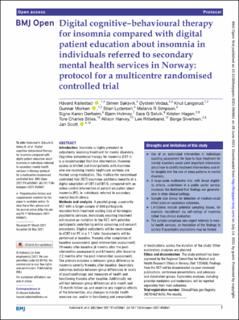Digital cognitive-behavioural therapy for insomnia compared with digital patient education about insomnia in individuals referred to secondary mental health services in Norway: Protocol for a multicentre randomised controlled trial
Kallestad, Håvard; Saksvik, Simen Berg; Vedaa, Øystein; Langsrud, Knut; Morken, Gunnar; Lydersen, Stian; Simpson, Melanie Rae; Dørheim, Signe Karen; Holmøy, Bjørn; Germans Selvik, Sara; Hagen, Kristen; Stiles, Tore C; Harvey, Allison G.; Ritterband, Lee M.; Sivertsen, Børge; Scott, Janine Linda
Peer reviewed, Journal article
Published version

Åpne
Permanent lenke
https://hdl.handle.net/11250/2788360Utgivelsesdato
2021Metadata
Vis full innførselSamlinger
Sammendrag
Introduction Insomnia is highly prevalent in outpatients receiving treatment for mental disorders. Cognitive–behavioural therapy for insomnia (CBT-I) is a recommended first-line intervention. However, access is limited and most patients with insomnia who are receiving mental healthcare services are treated using medication. This multicentre randomised controlled trial (RCT) examines additional benefits of a digital adaptation of CBT-I (dCBT-I), compared with an online control intervention of patient education about insomnia (PE), in individuals referred to secondary mental health clinics.
Methods and analysis A parallel group, superiority RCT with a target sample of 800 participants recruited from treatment waiting lists at Norwegian psychiatric services. Individuals awaiting treatment will receive an invitation to the RCT, with potential participants undertaking online screening and consent procedures. Eligible outpatients will be randomised to dCBT-I or PE in a 1:1 ratio. Assessments will be performed at baseline, 9 weeks after completion of baseline assessments (post-intervention assessment), 33 weeks after baseline (6 months after the post-intervention assessment) and 61 weeks after baseline (12 months after the post-intervention assessment). The primary outcome is between-group difference in insomnia severity 9 weeks after baseline. Secondary outcomes include between-group differences in levels of psychopathology, and measures of health and functioning 9 weeks after baseline. Additionally, we will test between-group differences at 6-month and 12-month follow-up, and examine any negative effects of the intervention, any changes in mental health resource use, and/or in functioning and prescription of medications across the duration of the study. Other exploratory analyses are planned.
